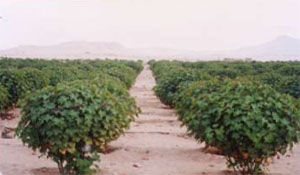
Afforestation
Afforestation is the action of planting a forest where there were previously no forest stood. The targeted land was once formally used for purposes other than forestry. The successful treatment of sewage water leads to afforestation and the planting of Jatropha. Afforestation in Egypt has a multi-functional approach. In Egypt, its established plantations can be of considerable economical, ecological, and social importance.
Waste water treatment
The afforestation project in Egypt has a wide framework. A large portion of that framework is also dedicated to the allocation of the available waste water. The potential of what could be done with the waste water makes the waste water a very vital aspect of the afforestation process. Heavy Emphasis is made on improving its treatment to ensure the safety and quality of the treated waste water. Thus making sure that its irrigating the plantation forests would be effective.
Planting Jatropha in Egypt
Initially, through "The National Programme for Treated Sewage Water for Afforestation," a pilot project was directed on a large portion of the country to determine whether or not the act of afforestation, using basic-treated sewage water, would be successful or not. The afforestation includes a number of different species; including Jatropha and Jojoba. Which are planted and used as bio fuel crops. Thus, the successful planting of these plants through the pilot project has illustrated that sewage water can be used for the formation of new forest in desert lands.
The programme also demonstrated the high potential for the afforestation of species that could be used for multiple purposes of socio-economic importance. To ensure sustainability and the economical success of the project, this is achieved by a very capable framework and planning through the political, economical,and scientific environment.
The project is supported by applied research. The main goal is the development of a support system for the sustainable management of plantation forests in regions that lack moisture. The supporting scientific work is carried out by highly qualified German and Egyptian scientists.
Objectives
- Using water resources efficiently.
- Decreasing pollution through the growth of planted trees.
- Renewable energy sources through wood & Biofuel.
- Food security for the population through combating desertification.
- Erosion & Sand Dune protection.
Costs
The Egyptian Government has used a considerable amount of funds on the development of the infrastructure necessary for the safe use of treated sewage water for afforestation. Ever since the thought to promote the establishment of sustainable forestry in the desert lands of Egypt using sewage water, large-scale afforestation by private sector as well as national and international organizations has been initiated. The government is now developing ways to include the involvement of national and international organizations in order to encourage investment activities.
Overview
Jatropha planting and the overall afforestation in Luxor (Upper Egypt) has done considerably better than similar projects in other countries for a number of many different reasons. It has a increased rate of growth and productivity. Baby tree's produce seeds after 18 months of planting, compared with 3 years in other countries.
References
http://sc-ope.com/daad/wp-content/uploads/2013/06/Project-description-1-Information-Summary.pdf
http://www.eeaa.gov.eg/english/main/env_forests_jatropha.asp
http://www.worldresourcesforum.org/files/WRF2013/Workshops/Jan%20Benjamin%20Eger.pdf
https://www.ipcc.ch/ipccreports/sres/land_use/index.php?idp=47